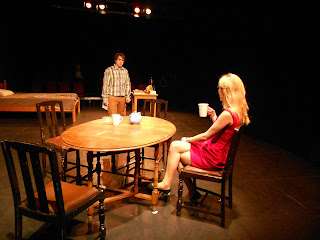From the start of this process, I was concerned with the way in which I would be as a director. I felt that I didn't have the same approach as Abi - I wasn't hands on, couldn't think up clever, engaging warm-up workshops, and preferred to sit back and let the play unfold instinctively before making adjustments according to my own vision. Anne Bogart said something similar in her book
A Director Prepares, in which she stated "I listen until there is movement and then I begin to swim"
1 (2004: 2), referencing the way in which sharks will sit quietly at the bottom of the seabed until they sense vibrations of their prey. Rather than frantically searching for actors' motivations or actions, I wait until they move of their own accord and then make alterations as I see fit. It encourages me that other directors have a similar way of working.
I'm continuing to learn now that it is important, particularly in a co-directorship, for these differences in the way we approach the rehearsal room. This means that Abi and I are seldom at odds with one another, but rather compliment each other's work and attitudes, presenting different opinions and producing different results that merge towards the common goal of the play. Whereas I find it hard to develop workshops that access a particular part or theme of the play, I find it far easier to envisage the piece as an entire text, a whole period in time that develops and moves naturally in a linear fashion. This is mentioned by Katie Mitchell, who suggests that "Learning to hold the whole picture of what the audience will see in your head as you read the text is critical."
2 (2008: 4) - and this is, luckily, what I find easiest. Whilst reading the play felt difficult, I was able to generate a 'film-like' version of it that I can now relate to my actors on stage, knowing full well how they are going to move from one scene to the next, and how their emotions and attitudes build in the context of several months.
Throughout the decades, directors have had different ideas about the best way to present a text, and these differences have sparked numerous debates. Some of these debates have been discussed in the book
Re:Direction: A Theoretical and Practical Guide, edited by Rebecca Schneider and Gabrielle H Cody; as Cody writes in her introduction to Part III, 'Theatres of community and transculturalism', "While realistic Directors like Lee Strasberg would still privilege an 'angle of viewing', directors such as Artaud would strive for a profoundly communal experience."
3 (2002: 217). This indicates that even the best directors throughout history have expressed unique and individual styles of directing which is evident in their plays themselves. Therefore, my own style coupled with Abi's ability to workshop and stimulate the actors should, in theory, produce a play that is both heavily grounded in textual analysis and understanding, and born from actor experimentation and evolution. Whilst my style relates to "the processes of reading and interpretation which determine meaning"
4 (Rabkin, G. 2002: 329) in the text, Abi works best through physicality and improvisation; this combination of attributes allows for a full and complex production that is intellectual and instinctive.
Whilst previously I'd been nervous in the rehearsal room, unsure of my role as director and whether or not I was doing the 'right' thing, I now am confident in my position as the observer-director. I am free to interject the actors whenever I feel necessary, whilst also taking notes throughout Abi's workshops which give insight into the characters' subconscious actions and influence my scene work. It is encouraging to read about directors in the past who have had alternate ways of working, and how not one can be considered better than another. By establishing myself and what I am comfortable doing in terms of direction, I can move into this final chapter of the rehearsal process knowing that the way we've been working this far has been successful.
(
1) Bogart, A. (2004),
A Director Prepares: Seven Essays on Art and Theatre, Routledge
(
2) Mitchell, K. (2008),
The Director's Craft: A Handbook for the Theatre, Routledge
(
3) Cody, G. (2002), 'Introduction to Part III', in Cody, G. and Schneider, R. (eds)
Re:Direction: A Theoretical and Practical Guide, Routledge
(
4) Rabkin, G. (2002), 'Is there a text on this stage? Theatre, authorship, interpretation', in Cody, G. and Schneider, R. (eds)
Re:Direction: A Theoretical and Practical Guide, Routledge






















